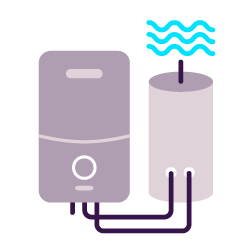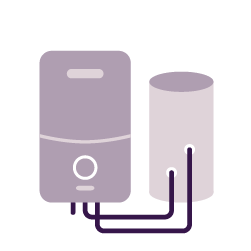Your guide to regular boilers.
What is a regular (a.k.a conventional or heat only) boiler?
Regular boilers are also known as conventional boilers or heat only boilers. They are one of the most powerful heating systems for your home, but also one of the largest. On top of the boiler itself, they require a hot water cylinder and a water tank.

Get £100 off a new BOXT boiler.
We’ve partnered with BOXT to save you £100 on new boiler installations. Get a fixed price quote online in minutes, plus you could get your new boiler installed the very next working day.1 T&Cs apply.
How do regular boilers work?
Regular boiler systems use a heat exchanger to heat water supplied from a cold water tank in the loft. The heated water is then stored in the hot water storage cylinder - ready to be pumped through your central heating or directly to your taps.
Water from your mains supply is collected inside the tank and uses gravity to flow into the cylinder, rather than your mains water pressure.
There are two types of regular boiler:
Open vented boilers
Open vent systems have an unsealed pipe over an F&E tank (feed and expansion tank) to relieve pressure from your central heating system when it is being used. Since these tanks are open to the air it is recommended that they are cleaned once in a while to prevent erosion and debris.
Sealed system boilers
Sealed system boilers have an expansion tank instead of an F&E tank, which is enclosed with a valve to release additional pressure. Unvented systems are often cleaner and more efficient than open vent systems. However, they may not suit your home if you have older radiators.
How do regular boilers compare to system or combi boilers?
Take a look at the key differences between each and find the right boiler type for you.

Regular (conventional or heat only) boilers.
The largest heating system, regular boilers need loft space for a cold water storage tank as well as space for a hot water cylinder. The cold water tank supplies water using gravity instead of your mains water pressure.
Best suited for: large homes with high hot water demand and low water pressure, or homes with old radiator systems.

System boilers.
System boilers take cold water from your mains, meaning they use your mains water pressure. They also need space for a hot water tank where they pre-heat and store water.
Best suited for: homes with high hot water demand and good mains water pressure.

Combi boilers.
Small but mighty, combi boilers do not need a water cylinder or tank. They use your mains water pressure and heat your water on demand so you never run out. They do not cope well with high demand from multiple taps or showers though.
Best suited for: small or medium homes with good water pressure.
What are the advantages of getting a regular boiler?
They are a good option for homes:
In areas of low water pressure as the water pressure is generated through gravity.
That regularly use multiple taps and showers at once, such as houses with multiple bathrooms, as water is pre-heated and stored ready for use.
With old radiators and pipes that may be damaged by high mains water pressure.
With solar panels, which can be connected to help heat your hot water, saving you money on your fuel bills.
How much do regular boilers cost to run?
Running costs depend on how much you use your heating and hot water, and the energy efficiency of your boiler. To reduce your running costs, try to pick a regular boiler with the right power for your home. More powerful can be more expensive, but if your boiler is not powerful enough it may not provide enough hot water to meet your needs.
Whether you have a regular, system, or combi boiler, the more you use your central heating and hot water, the higher your bills will be. To help save more money on your fuel bills, try upgrading to a more energy efficient model.
Why choose a Worcester Bosch Greenstar boiler?
The UK’s favourite boilers.
Worcester Bosch is the UK’s market-leading domestic boiler brand - helping to heat our homes for more than 50 years.
Powerful and efficient.
Choose from our range of Worcester Bosch Greenstar boilers. A-rated and up to 94% efficient, they could help you waste less fuel and save on your energy bills.
Awarded Best Buy by Which?
The Greenstar 4000 combi, is a leading Which? Best Buy. The Greenstar range uses advanced technology to create powerful boiler systems with modern designs to suit your home’s needs.
What size regular boiler do I need?
Here’s a quick guide to help you decide.
1-2 bedroom homes need roughly 12-18kWs.
3-4 bedroom homes need roughly 28-34kWs.
5+ bedroom homes usually need 35kWs or more.
Ultimately, your boiler size will need to meet your hot water and central heating output, which usually increases with house size. For every radiator in your home you generally need 1-2kWs of power.
Are there any disadvantages to regular boilers?
Like all boilers, there are pros and cons to getting a regular boiler, so they will suit some homes better than others.
Loft space is required for the cold water tank.
An airing cupboard (or alternative space) will be needed for the hot water cylinder.
At very busy times, if the cylinder is emptied, you will need to wait around an hour for more to be heated.
We recommend adding insulation to your cylinder.
Your FAQs about regular boilers.
Should I change my regular boiler to a combi boiler?
How energy efficient are regular boilers?
Does a regular boiler heat water?
1 Next working day installation when you order before 3pm, subject to availability
E.ON Next is a trading name of E.ON Next Energy Limited. E.ON Next Energy Limited is a company registered in England and Wales. Registered number: 03782443. Registered office: Westwood Way, Westwood Business park, Coventry, CV4 8LG. E.ON Next brings you this discount offer through BOXT Limited (CRN: 08086606) whose registered office is at 3320 Century Way Thorpe Park, Leeds, West Yorkshire, England, LS15 8ZB (“BOXT”). This £100 discount is only available to E.ON and E.ON Next customers who have current/active accounts at the time of the installation of the gas boiler installed by BOXT. Only one discount available per boiler installation on all gas boilers. The discount will be applied to the cost of the boiler requested. Installation must be booked within 30 days of the date of the quote provided by BOXT to the customer. No cash alternatives given. E.ON Next and BOXT reserve the right to withdraw or amend this offer at anytime.
